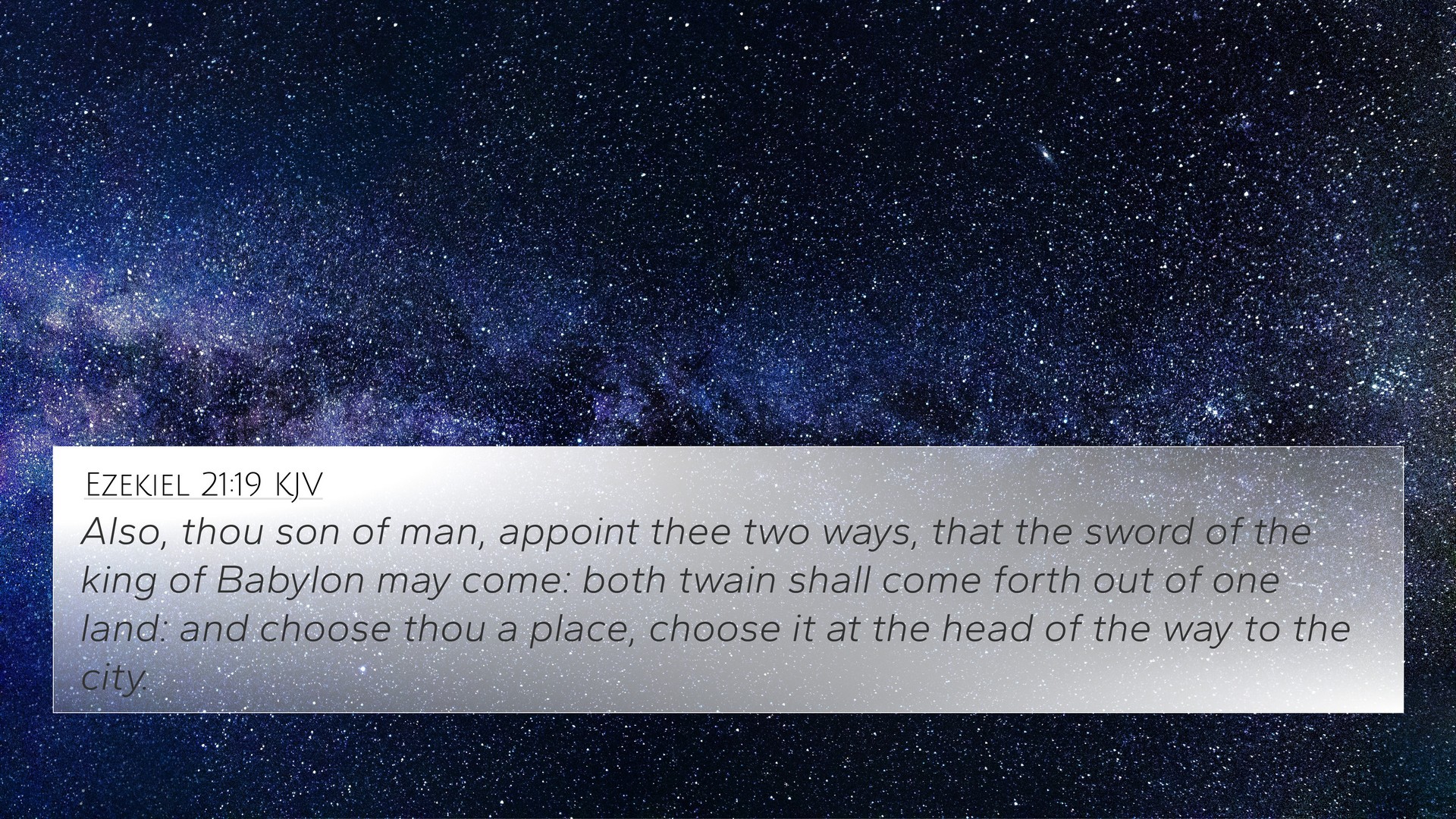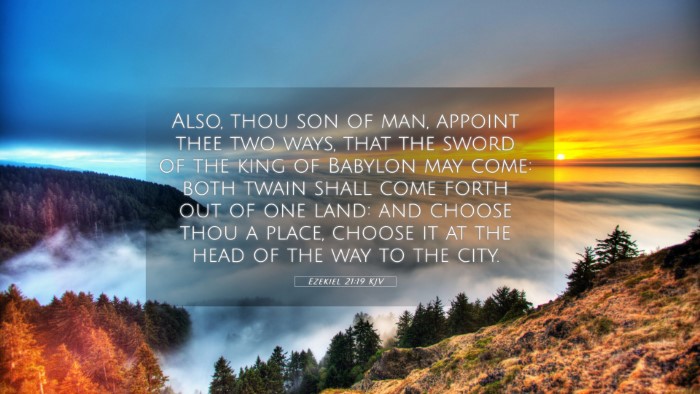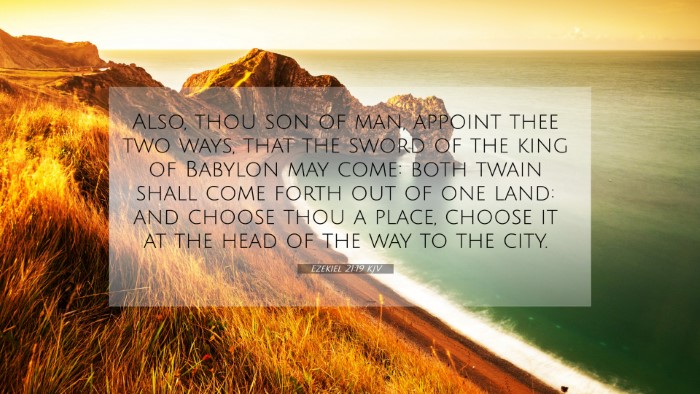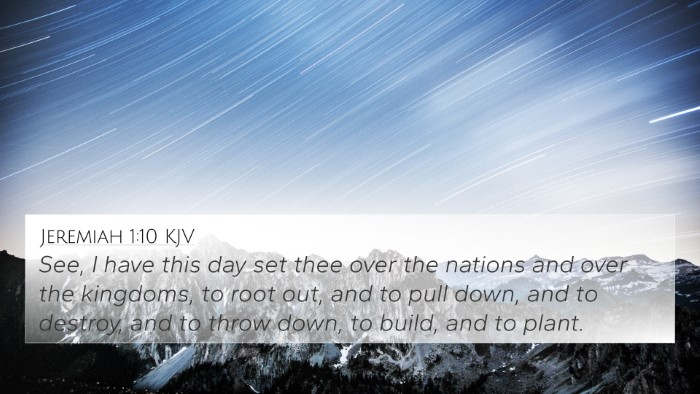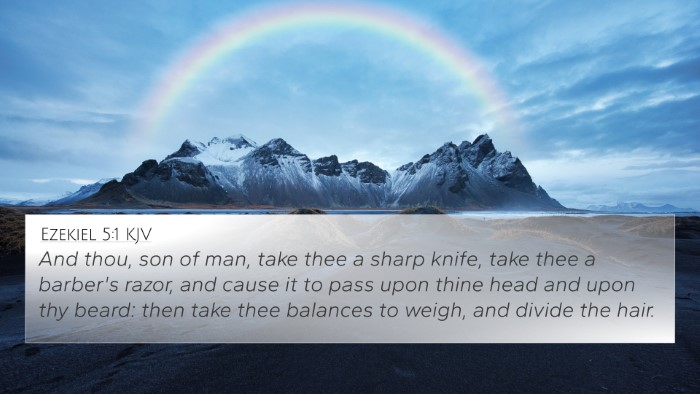Ezekiel 21:19 - Meaning and Interpretation
The verse Ezekiel 21:19 states: "As for you, son of man, mark two ways for the sword of the king of Babylon to come; both twain shall come forth out of one land: and choose thou a place, choose it at the head of the way to the city."
Summary of Insights
This passage illustrates a critical moment in the communications from God to the prophet Ezekiel, emphasizing the upcoming judgment on Jerusalem and the choices that lay ahead. The choice of paths highlights the decisive nature of God's will where human agency intersect with divine purpose.
Commentary Insights
- Matthew Henry: Henry describes how the Lord instructs Ezekiel to demonstrate the choices before the Babylonian king. The significance of the two ways is emphasized, portraying that there are consequences attached to the decisions made along those paths.
- Albert Barnes: Barnes interprets the symbolism of the two paths as representing the looming invasions and the options available for those in leadership. The instruction to choose illustrates the necessity of making a strategic decision in light of the impending conflict.
- Adam Clarke: Clarke expands on the imagery of the sword, urging readers to understand this as a symbol of God's judgment. The call to choose is an invitation for reflection on the state of the people and leadership in Jerusalem, indicating a moment of critical importance.
Connections Across Scripture
Understanding Ezekiel 21:19 requires recognizing its ties to other scriptures. Here are some significant cross-references:
- Ezekiel 20:46: Discusses the division of the land and the judgment of the people, reinforcing the themes of direction and decision.
- Jeremiah 1:14: Illustrates the idea of judgment approaching from the north, showing God's control over nations and His will being executed through political means.
- Daniel 2:37-39: Daniel's prophecy about kingdoms serves as a background for understanding the significance of Babylon in Ezekiel's prophecy.
- Isaiah 7:15-16: Highlights the prophetic choice and the impact of decisions made through the lens of divine judgment.
- 2 Kings 24:10-17: Provides historical context surrounding the siege of Jerusalem and the resulting upheaval.
- Jeremiah 52:7-9: Describes the fall of Jerusalem and the actions of the Babylonian king, correlating with the themes found in Ezekiel.
- Isaiah 30:21: Speaks about the importance of following God's guidance, encapsulating the essence of the choices laid out in Ezekiel.
- Zechariah 1:14: Relates to the message of judgment and restoration, underscoring the importance of the prophetic voice in decision-making.
- Ezekiel 33:2-5: Offers insight into the responsibility of watchmen, further emphasizing the call to make informed choices.
- Proverbs 14:12: Clears the pathway for understanding the seriousness of choices by suggesting that there is a way that seems right, but its end is destruction.
Thematic Connections
Ezekiel 21:19 encapsulates themes of judgment, decision-making, and divine sovereignty, making it vital for comparative Bible verse analysis. The themes resonate with numerous biblical texts that explore the interaction between God's plan and human decisions.
Framework for Further Study
-
Tools for Bible Cross-Referencing: Utilizing a bible concordance can aid in exploring these connections systematically.
-
Cross-Reference Bible Study: Engage in methods that allow grouping by themes, exploring links between the Old and New Testament.
-
How to Use Bible Cross-References: Taking time to study verses side by side helps in understanding the holistic message of scripture.
-
Bible Reference Resources: Comprehensive guides assist with understanding the layers of meaning across various texts.
Conclusion
Ezekiel 21:19 serves as a poignant reminder of the intersection of divine judgment and human choices. As Christians engage with this text, it is crucial to consider its implications and connect with related scripture to build a robust understanding of God's message throughout the Bible. This verse stands not only as a historical account but also as a living admonition for today's followers to discern God's guidance amid life's choices.
